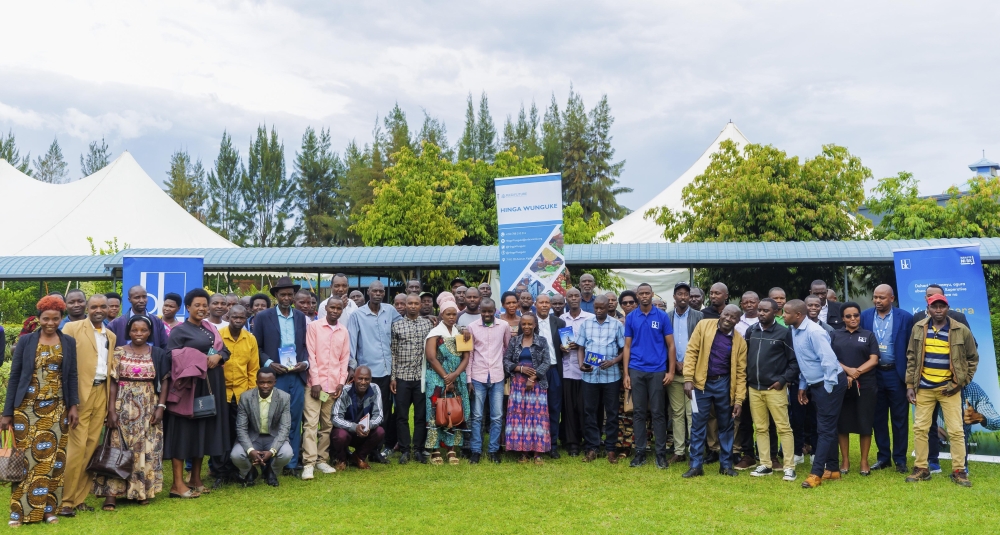

Bank of Kigali is strengthening Rwanda's agribusiness sector through its "Kungahara na BK" loan, designed to empower cooperatives across the country's key agricultural industries.
To raise awareness and engage with local farmers, BK held a two-day forum in Kayonza District on November 26 and 27, specifically targeting maize, rice, dairy, tea, and Irish potato cooperatives, offering them a range of loan products and subsidy options to boost productivity.
This forum in Kayonza was organized in collaboration with USAID Hinga Wunguke, a partnership aimed at enhancing farmers’ access to financial services and agribusiness training. The joint effort reflects the shared commitment of both organizations to improve agricultural productivity and livelihoods in Rwanda.
"Kungahara na BK" provides up to 50 million Rwandan Francs, with five types of loans tailored to different needs: loans that require collateral during harvest season, loans without collateral offered each season, loans for dairy cooperatives, loans based on bills post-harvest, and loans for additional financing.
Through this campaign, BK is promoting financial solutions for both cooperatives and individual farmers, offering loans for production, aggregation, transport, and more, all with flexible repayment models aligned with the farmers' harvest cycles.
ALSO READ: Bank of Kigali launches ‘Nanjye ni BK&039; campaign to promote inclusivity in banking
Approximately 200 farmers and members of cooperatives attended the forums, receiving key information about the loan’s benefit and how it could boost their productivity.
According to Theophile Akwiyimana, the agribusiness manager at the Bank of Kigali, the goal is to reach a larger number of farmers, spread awareness, and market the loan products through the campaign.
"With this loan, the bank offers a variety of loans to support farmers, for instance, for individual farmers to finance their production activities, aggregation, and transportation of harvests, and in addition, there are subsidy schemes like the Economic Recovery Fund (EREF2), which offers loans at an 8% interest rate,” he said.
Akwiyimana explained that the bank’s loans under the Kungahara na BK program do not have a fixed upper limit. The loan amount depends on the capacity of the requesting farmers or cooperatives.
"For the loan, for Kungahara, we have, depending on the capacity of the farmers requesting the loans. So, there is no limit for the loan,” he said.
He also added that Bank of Kigali has already disbursed significant amounts and aims to reach a total loan book of 100 billion USD in the next five years, underlining that the application process, farmers and cooperatives can apply for unsecured loans by submitting a board resolution requesting the loan, tax clearance, and an application letter. Once these requirements are met, the bank can process the application, and the loan is typically disbursed within three weeks.
"These loans are helping farmers’ access essential inputs such as fertilizers and improved seeds, thereby increasing productivity. Additionally, loans for post-harvest activities and transportation are helping farmers manage their harvests and improve their livelihoods,” he added.
ALSO READ: Bank of Kigali empowers agents to drive financial inclusion
Benon Gakwandi, the chairman of Abashumba Beza Cooperative, shared his positive experience with the Bank of Kigali’s Kungahara na BK loan. His cooperative, which focuses on dairy farming, received a loan of 42 million Rwandan Francs with 500 members.
"We are still repaying the loan, but it has been very beneficial for us and helped the cooperative secure a line of credit to further support its members and in our cooperative, we even had the opportunity to buy our own truck, which helps us transport our milk,” Gakwandi said.
The cooperative currently manages 100 members and 15,000 cows. Gakwandi explained that they have an agreement with Inyange, a dairy processing company, through which payments are made directly via the Bank of Kigali.
"When Inyange pays us, the bank deducts what we owe, and the remaining balance goes to the cooperative,” he added.
For Elizabeth Nyiranteziryayo, the treasurer of a rice farming cooperative, the Kungahara na BK forum provided valuable insights into loan opportunities, she encouraged her cooperative to apply for the loan before others since the low harvest made it challenging to meet their needs.
"This forum has taught me a lot about loans, and what I particularly appreciate about Kungahara na BK is their interest rate, especially as we are entering the harvesting season, which is why I’m urging my cooperative to apply for the loan now so that we can use it to improve our operations and be prepared when the new season starting in January,” she said.
She also emphasized that the loan products are beneficial not only for cooperatives but also for individual farmers.
"The good thing is that BK even offers options for individual farmers, which will help all farmers in general,” she added.
To further empower farmers with Kungahara Na BK, the Bank of Kigali plans to host regional forums in Huye, Rusizi, Musanze, and Gicumbi, ensuring the initiative reaches every farmer across the country.


